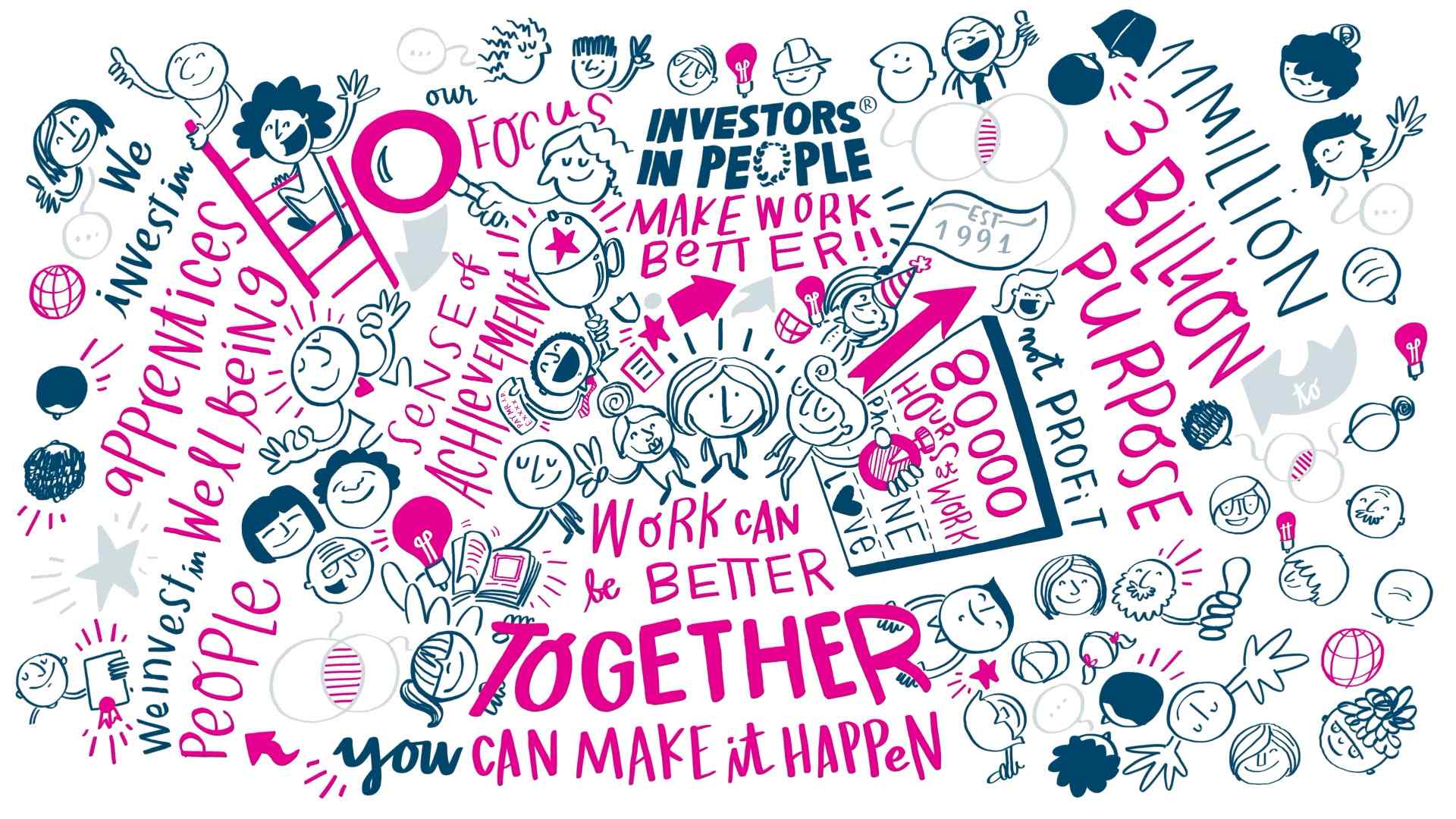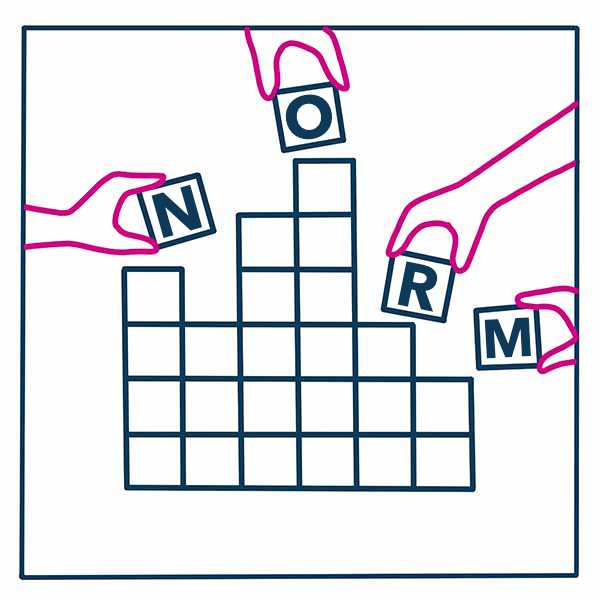We believe that together we can make work better for people. And through creating better work, we can build a better, more productive and healthier society now and for future generations.
And we want you to join us as we embark on a journey to build a better normal.
It might involve a wrong turn here and there, take longer than planned and there’ll probably be a few stops to ask for help.
But we’ll be there step for step and side by side with you.
We’re stronger together, so let’s get going on our journey…
… to build a better normal, one workplace at a time.
On your marks….
So we’ve put a pin in the map for our destination – a ‘better normal’. But how do we know if we’re staying on course? By holding ourselves accountable and making some firm commitments to change.
Think of these commitments as the landmarks that’ll let you know you’re on track.
We are asking you to join us in making seven commitments to make a ‘better normal’. We’ve based these on what we’ve heard from our community, research underpinning our frameworks and the United Nations’ sustainable development goals.
It’s ambitious, but we’re not doing this just for us.
We’re doing it for the three billion people employed around the globe.
Let’s make work better…
Get set!
Fired up and ready to join us on our journey?
Get signed up to our mailing list, make your own workplace commitments or reach straight out to us for information on our accreditations.
If you’re nailing this already, fantastic! Get your hard work recognised at The Investors in People Awards 2020! Our Awards are open to celebrate any organisation or individual.
Whichever route you choose, you’ll be joining a crowd of other like-minded people who have all made commitments, just like you. We can all share our learning and resources along the way.
There will be challenges but we can overcome them; we’re all in it together.
And together we will build a better normal.
Make work
Go!
Commitment 1: Make work agile and flexible
The number of people with the option to work from home was already rising, but the lockdown necessitated that everyone who could, did. This resulted in a huge shift, with a peak of 50% of adults working from home as surveyed by the Government during April.
Working from home has brought its challenges, but also opportunities. We’ve heard from our community that people are feeling trusted and empowered like never before with the flexibility to work to a schedule that suits them as well as the employer. There has also often been a simplification of focus, leading to faster results and bold decision making. Many business leaders have indicated that they will not be returning to the old normal. According to Barclays CEO, Jes Staley, a ‘big city office’ “may be a thing of the past”.
So we are asking you to join us in making work flexible and agile.
Here’s what that looks like:
- Trust is a central part of the way people are managed
- Work is about outputs, not when and where we work
- Workloads are managed to be sustainable
- Individual arrangements agreed within teams
- Investment in enhancing communication and connection
- People are empowered to innovate and make decisions at a local level
- People are encouraged to think like ‘owners’ and have an entrepreneurial mindset
- Mistakes and failures are embraced as learning
Commitment 2: Make work for people, not resources
We are not resources. We are people; parents, carers, friends… The ‘old’ way of working, with work personas and policies that made people into homogenous groups of ‘resources’ is over. To build a better normal, we need to embrace people-first practices, which reflect our individual needs and motivations, treat people as adults and assume trust as a starting point.
Our recent survey told us people are concerned about juggling responsibilities, family commitments and finding motivation and inspiration while working from home. We’ve seen leaders opening up about their own struggles too, showing their ‘human’ side and engendering deeper trust and respect from their teams as a result.
There’s an opportunity in this moment of change to re-design work around what works for your people as well as what needs to be done and achieved. Treating your team as if they were customers, listening to them and employing techniques from research into psychology and neuroscience will make work better for your people.
As Lucy Adams of Disrupted HR says ‘For all the sadness of this crisis, it presents HR with an amazing opportunity to create something better’.
We are asking you to join us in making work for people, not resources.
Here’s what that looks like:
- Start with your people, and what they value, for any new initiatives/processes
- Consult with, and listen to your people, when making decisions which will impact them
- Devolve recognition and awards to teams and managers to make them more meaningful
- Re-visit your people policies/handbook. Does it assume trust?
- Leaders are open, humble and relatable
- Everyone is paid a fair wage, and you are committed to paying the Real Living Wage
Why not find out where you stack up against We invest in people?
Commitment 3: Make work diverse and inclusive
We’re all in the same storm, but we’re sailing in different boats. All of our lives have been touched by this crisis in some way, but the way we’ve experienced that impact has differed from person to person, based on our ethnicity, orientation and the sum of everything that makes us unique. We believe there is a role for leaders to work together to make businesses more diverse, but most importantly more inclusive as we enter our new normal.
Building on the first two commitments (increasing flexibility and treating people as individuals), boosting the diversity and inclusivity of the workplace creates better business results as well as making a difference to peoples’ lives. Without a culture of inclusiveness you’ll see other initiatives struggle to succeed, as teams lack the psychological safety and trust to commit to real change. We’ve heard from leaders how combining people from diverse backgrounds and with differing views to work on business challenges during this crisis has resulted in better and more creative solutions. This isn’t a new trend- increased globalisation and technological advances have created opportunities for diverse teams, often in different countries and timezones, to collaborate and share ideas.
As Amina J Mohammed, UN Deputy Secretary-General has put it: “Lasting peace and sustainable development can only be built on the equality, human rights and dignity of everyone”.
We are asking you to join us in making work more diverse and inclusive
Here are some ideas on what this might look like:
- Diverse teams exist at all levels and your workforce reflects your local community
- Everyone is encouraged to bring their whole-self to work
- Work is designed to be accessible for as many people/groups as possible
- Create space and platforms for everyone to be heard (including affinity networks)
- Provide training and resources on how people experience life differently (including cultural awareness and unconscious bias)
- Gather data on D&I – both quantitative and qualitative – and use this to drive improvements. Be transparent with it so your people can see where progress is being made
- Individual circumstances are considered as part of performance conversations
- The Race at Work Charter (created by BITC) is embraced
- Involve your people by facilitating the formation of Diversity Champions groups and consulting them on workplace policies
- Scrutinise your ‘employee journey’, especially at attraction and selection stages in recruitment, to assess how it is experienced and whether it is fair
Commitment 4: Make work that ensures business for good
We are facing another ‘moment of reckoning’ for people’s trust in business. People are looking to businesses and CEO’s for support and resources alongside local and national Governments, both now and as we begin to enter economic and social recovery.
In our community, we’ve heard from leaders that have pivoted their business to directly support the communities in which they’re based, by providing essential PPE and food to key workers or extending credit across their value chains or supporting valued social enterprises. Businesses have returned to their core purpose and values and used these to inform their responses.
Looking to the future, social responsibility and the role that a business plays in supporting its local community is an important driver of attracting millennial talent and discerning consumers.
“This pandemic is turning out to be a grim but vital reminder that we human beings are here on this planet to take care of each other — and business is a way we can do that at scale” – HBR
We are asking you to join us in making work that benefits the community
This may look like:
- Supporting your supply chains to adhere to the same standards of people management
- Consulting external stakeholders as part of key business decisions
- Extending support to small suppliers and social enterprises during the recovery
- Providing opportunities for people to connect/volunteer in the community
- Committing a percentage of your supply chain spend to worthy social enterprises in the local community
For the next generation our new normal=their normal.
Commitment 5: Make work that enhances wellbeing
Wellbeing is made up of our social, physical and psychological health, and all three of these areas have been impacted over the last few months. In some areas it has been positive, as people have converted time previously for commuting to exercise or personal reflection or meditation, but in others it has been very challenging, particularly where people have felt alone and isolated or a bereavement has occurred. Routines and daily schedules carefully crafted, potentially over many years, that provide self-care and prioritise mental health have been upheaved over night.
We’ve seen leaders using wellbeing as the centre point for engaging with their people during this time, and in concert with a people-first approach. People have embraced ‘being kind’ and are opening conversations about mental health and self-care in an entirely new way, destigmatising the terminology around mental health.
We are asking you to join us in making work that enhances our wellbeing
What might this look like?
- Collecting data and designing an approach for improving psychological, physical and social wellbeing
- Designing people practices which enhance and protect wellbeing
- Putting wellbeing and peer support at the heart of L&D and performance management
- Supporting movements and causes progressing wellbeing at work, such as the Inside Out and Time to Change charter and charities like Mind and Samaritans
- Encouraging positive and safe space conversations around personal experience of mental health
- Providing support, resources and tools to enhance the wellbeing of your people (including the training and appointment of Wellbeing Ambassadors and Mental Health First Aiders)
- Commit to raising awareness and organising activities around the calendar of national health and wellbeing campaigns
Why not find out how you stack up against We invest in wellbeing?
Commitment 6: Make work that invests in young talent
This crisis will have a lasting impact on young people. At the time of writing, one third of 18-24 year olds have lost work due to furloughing or job loss, significantly more than any other demographic.
Investing in young talent also has real business impact. We’ve heard from our community that many of the innovative new ideas for adapting the business have come from younger team members, and their passion and drive has lifted teams during some of the toughest moments.
For young people entering the workplace over the next few years, they will have had to grapple with unique challenges such as limitations on placements, entirely virtual lessons and fewer opportunities to mingle with peers. “Businesses must ensure they recruit for talent and potential, not just exam results, when access to education and opportunity has been even more unequal than ever” BITC.
We are asking you to join us in making work that invests in young talent
This could look like:
- Apprenticeship schemes are used where possible, and are set up to support, motivate and develop young people as they ‘earn as they learn’
- Leaders mentor new team members
- Organisation fosters connections with colleges or educational institutions feeding into their industry
- Active future talent planning takes place
- Commit to a percentage of your workforce being made up of young talent
Do you employ apprentices? Find out what you’re doing perfectly and where you need to focus, with We invest in apprentices.
Commitment 7: Make work greener and sustainable
This crisis has accelerated many trends, but it’s unclear whether a real and sustained reduction in carbon emissions will be one of them. In the first week of April, daily emissions worldwide were 17% less than last year. It’s likely that this year we’ll see the lowest global industrial greenhouse-gas emissions since WW2. As economies begin to recover, we will either look back on 2019 as the peak for emissions globally, or as a temporary hiatus in an ongoing climb.
Businesses can influence what happens next, by encouraging more people to work from home, holding meetings virtually instead of travelling distances and consciously investing in and supporting other green businesses. Leaders will need to work together to make supply chains ‘cleaner’ and partner with Governments to make this recovery the start of a sustained fall in industrial damage to the environment. As the MD of the IMF said , “The best memorial we can build for those who lost their lives in the pandemic is a greener, smarter, fairer world,”.
We are asking you to join us in making work greener and sustainable
What does this look like?
- Understanding and minimising the environmental impact of your business and workplace
- Seeking continual improvement and committing to reductions in your environmental footprint
- Making this relevant to everyday choices and decisions in the way you work and use resources
- Adopting relevant accreditations to ensure best practice (e.g. ISO14001, EU Eco-Management and Audit Scheme, Green Mark)
- Holding your supply chain to the same green standards
We are passionate about improving people’s lives through work. When people are engaged and supported at work, they go home happier and their wider lives are enriched. Over time, that adds up to a happier and healthier society.
We know these commitments might seem pretty stretching, but starting small and sustained changes is all it takes to start the journey. add up to the biggest changes.
And we’re not working on this alone- we’re all in it together, all three billion of us employed around the globe.
And together we believe we can make work better.








